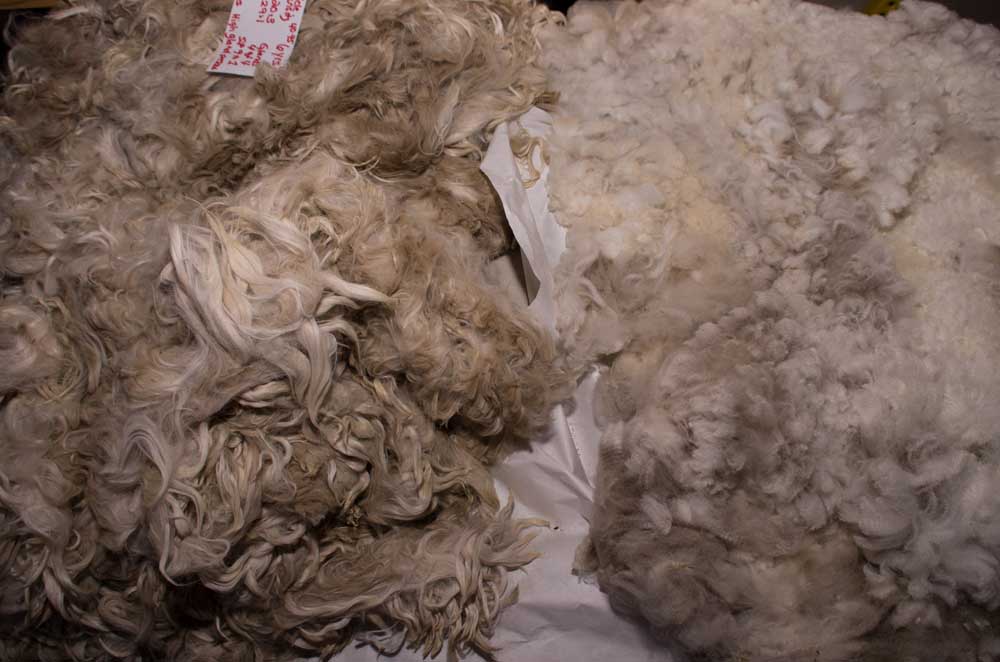Fiber farming
Published 12:00 am Wednesday, September 7, 2016

- Flying Dutchman Alpacas produce fiber from suri, left and huacaya alpacas.
The most expensive alpaca ever sold was from Central Oregon. At about $750,000, it’s safe to say the area can produce a high-dollar camelid.
Scott and Debbie Miller run and own Crescent Moon Ranch, the operation that produced the world-record-holding alpaca. Before the Millers were Debbie’s parents, Joe and Diane Nelson, and their friend Jerry Dunne — who entered the industry in 1996. The family business originated in the San Juan Islands of Washington and moved to Central Oregon in 2002 at a ranch off Lower Bridge Way. The Millers took over in 2014, and they moved the operation to the Crescent Moon Ranch property in Terrebonne. The site has about 150 alpacas on about 13 acres, plus about 30 acres of hay field.
“It’s working out well for us,” Scott said. “It’s exactly where we should be.”
The record-setting sale, which was a half-interest price tag making it the world’s first million-dollar alpaca at a full value of $1.5 million, put Crescent Moon on the map of the alpaca industry.
The Millers have been busy for more than a decade, logging more than 500,000 miles touring the country showing their alpacas, though they admit having slowed down in recent years. Debbie, a recent cancer survivor, has been around the animals since the beginning of the operation. They both have a fondness for the animals.
“They are very majestic,” Scott said. “They are really beautiful animals … each has its own individual personality.”
Not only is alpaca farming their chosen career path, it’s their passion. Their daughter Rachel Leason helps out at the ranch with her two children Emil, 1, and Clara, 2. Leason is due to give birth to a third child this month. Although it has been a family business, it is up to Leason and her husband if they want to continue the tradition. But, for now, the Millers are still going at full steam.
“We’re still in 100 percent,” Scott said. “This is what we know best, and this is what we love.”
Alpacas are known for their fiber, the animal’s hair, which is a silky smooth wool. Crescent Moon produces its own fiber but makes its staple from selling animals. While the farm sold an alpaca at a record-holding price, Scott said alpacas can range from $500 for a fiber-producing male to $25,000 for a breeding female, and when purchased by a new owner, two must be purchased together to maintain the herd mentality. Their worldwide notoriety makes Crescent Moon alpacas highly sought after.
The ranch also has a boutique, which offers a wide array of alpaca goods, including raw fiber and spun yarn. Some clothing made from Crescent Moon alpaca fiber is offered, but availability is limited and sporadic. There is a wide selection of alpaca fiber clothing from various other vendors.
“We appreciate and enjoy every part of the industry,” Debbie said.
Although the daily operation of the ranch resembles that of a sheep farm — except for daily cleanup of alpaca dung from the fields — the Millers said it is a unique industry. There are about 400,000 alpacas in the U.S., and they have resided in North America domestically since the 1990s, said Amanda VandenBosch, owner of Flying Dutchman Alpacas in Tumalo. Not only are alpaca farms a rarity, the Millers said the temperament of an alpaca is similar to that of a sheep and a horse. Each have individual personalities like horses, but the end product is more attune to that of sheep, which influences how they are handled, according to Scott. This combination gives the alpaca its own spot in the livestock world, Scott said.
“It’s a lifestyle,” Debbie said. “It’s a full circle from fiber to fashion. I get to see the birth of an alpaca and see them grow into an animal that makes quality fiber.”
Central Oregon is home to many alpaca farms, including VandenBosch’s. She is an international judge with the Alpaca Owners Association Inc. and travels the globe training judges and judging alpaca shows. She said that Central Oregon is a great place to raise alpacas because of its environment and good pastures. She also said the Central Oregon alpaca community is thriving.
“Life as an alpaca in Central Oregon is pretty damn good,” VandenBosch said. “The weather conditions here are really beneficial to these animals. It’s a great place to raise alpacas, and it’s a great place to live.”
There are two main kinds of alpaca, the suri and the huacaya. The suri produces a fiber that grows in locks and yields a finer end product that is used for lighter garments, while the huacaya produces a fiber that is crimped — as if a suri got a perm — and its end product is used for heavier garments. VandenBosch said that when judging, she looks for the alpaca that is truest to type for each breed, with similar criteria to that of steer judging. She also judges fiber color, of which there are 22 natural colors. She is also a partner of Spring Harvest Mill, which processes alpaca fiber. The mill processes the fiber from Crescent Moon as well. She said that improvements in the types of garments have increased in recent years with the use of a 3-D printing knitting machine, which allows for production of a much lighter garment.
“I think Debbie and Scott are doing a great job as shepherds and in promoting the end product,” VandenBosch said. “I think they are doing a fantastic job at their new location.”
The Central Oregon alpaca community has become a destination for alpaca farmers around the world. This year featured the eighth Education with a Destination, which was held mid-August. The multiday joint event hosted at both Crescent Moon and Flying Dutchman is a testament to the growing alpaca farming community in Central Oregon.
“It’s a really unique group of people,” VandenBosch said. “I don’t think you will find an alpaca farm that you will shrug at. Alpaca farmers have a genuine love for the animals, and it’s a community. Everyone is looking toward the common good.”
Although both farms stay busy with regular operations and hosting a couple of annual events — including spring shearing festivals — there remains a constant draw to alpacas from the surrounding community. The Millers are open to visits from the community; they guarantee free family fun. And while Scott can be found cleaning the pastures and Debbie will greet you at the boutique — if she isn’t busy helping an alpaca give birth — they said they constantly hear children’s laughter on a daily basis from visitors.
“One of the best things we’ve been able to experience is the novelty of the alpacas through the eyes of our visitors,” Scott said.
— Reporter, 541-548-2185, cbrown@redmondspokesman.com









